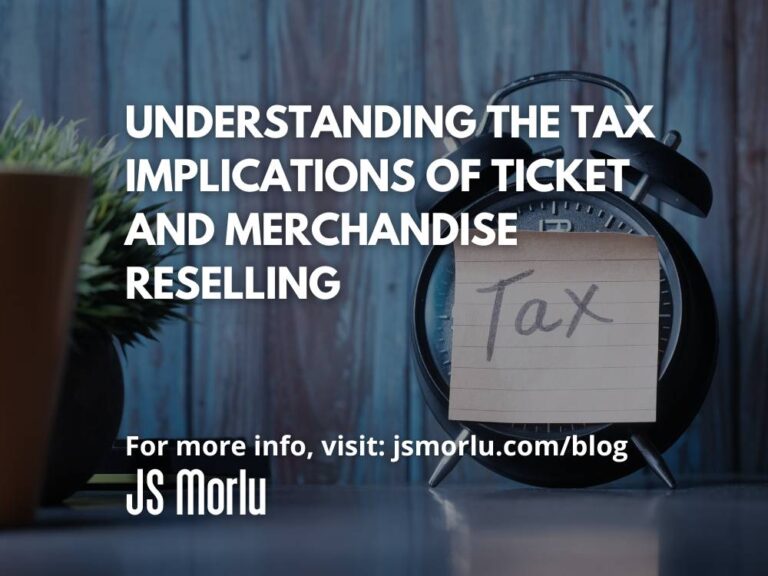In the thrilling realm of entertainment, securing tickets to highly coveted events such as Taylor Swift’s Eras Tour can be a golden opportunity. However, what many overlook in the pursuit of profit through reselling tickets is the intricate web of tax implications associated with such endeavors. This article explores the tax landscape surrounding ticket and merchandise reselling, emphasizing the critical concept of “Tax Implications” in this entrepreneurial domain.

The Profitable Pursuit: Ticket Reselling as a Business
Entering the business of ticket or merchandise reselling, whether for Taylor Swift’s concerts or other high-demand events, places individuals in the realm of entrepreneurship. According to the IRS, profits derived from these transactions are considered income and must be reported on tax returns. For established businesses, reporting income and expenses involves completing Schedule C (Profit or Loss from Business), encompassing revenue from ticket sales and associated costs.
A Lesson from Messi: Merchandise Reselling
Beyond tickets, reselling sports memorabilia, such as Lionel Messi’s iconic jerseys, is also subject to tax implications. The IRS treats the resale of merchandise as a business activity, necessitating the reporting of income and related expenses on Schedule C. The substantial financial value attached to sports memorabilia, exemplified by auctions of Messi’s jerseys and Michael Jordan’s game-worn items, underscores the importance of understanding and complying with tax regulations in this market.

The Importance of Cost Basis
A crucial aspect of reporting taxable gains is the consideration of cost basis, representing the original cost incurred to acquire tickets or merchandise. Deducting this cost from the income received ensures accurate reporting of profits and minimizes tax liabilities.
The Taylor Swift Effect: Massive Markups and Tax Liabilities
Examining the recent surge in Taylor Swift ticket resale prices highlights the potential for substantial profits and, consequently, significant tax obligations. Sellers capitalizing on high demand must be aware that marked-up ticket prices are subject to both income tax and self-employment tax. The soaring prices for the Eras Tour, exceeding face-value tickets by a significant margin, emphasize the need for sellers to comprehend and fulfill their tax responsibilities.
How the IRS Keeps Tabs: Reporting Laws
The IRS employs various reporting mechanisms to ensure compliance in the ticket reselling market. Collaboration with ticketing platforms and monitoring secondary marketplaces allows the IRS to identify sellers who may have overlooked their tax obligations. Technological advances have enhanced the IRS’s effectiveness in tracking potential tax liabilities stemming from ticket resales.

Seeking Professional Guidance
Navigating the complexities of tax laws demands the expertise of professionals. For effective tax planning, it is imperative to consult with a qualified tax professional who possesses in-depth knowledge in this domain. These professionals are equipped to offer personalized advice, assist in comprehending specific deductions, and ensure the accurate reporting of profits. To receive expert assistance tailored to your unique situation, please contact us.
Conclusion
While the potential for profit in ticket or merchandise sales is enticing, understanding and addressing tax implications is paramount. To fully capitalize on entrepreneurial ventures, it is crucial to familiarize yourself with the applicable rules and seek expert guidance. By doing so, you can navigate the intricacies of tax laws, ensuring compliance and maximizing your rewards. Whether you are dealing in Taylor Swift tickets or Lionel Messi memorabilia, always remember: mastering the tax game is as vital as playing it. For personalized assistance and guidance, please don’t hesitate to contact us.
JS Morlu LLC is a top-tier accounting firm based in Woodbridge, Virginia, with a team of highly experienced and qualified CPAs and business advisors. We are dedicated to providing comprehensive accounting, tax, and business advisory services to clients throughout the Washington, D.C. Metro Area and the surrounding regions. With over a decade of experience, we have cultivated a deep understanding of our clients’ needs and aspirations. We recognize that our clients seek more than just value-added accounting services; they seek a trusted partner who can guide them towards achieving their business goals and personal financial well-being.
Talk to us || What our clients says about us


